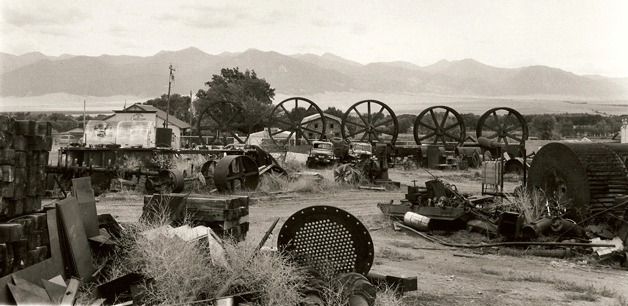Frances McCue drove and drove, slept, and drove some more to find the heart of a fellow poet.
The subject of her quest was Richard Hugo, the 20th century American poet from White Center, Wash. whose work reflects the stark forgotten towns of the Northwest.
McCue, a poet, teacher and the founding director of Seattle’s Richard Hugo House, invited the seminal Northwest photographer Mary Randlett to join her pilgrimage to the towns that inspired many of Hugo’s poems.
Part travelogue, part memoir, part literary scholarship, “The Car That Brought You Here Still Runs” charts the journey of McCue and Randlett, and provides a dramatic map into the heart of not only the towns that Hugo wrote about, but into the heart of poetry itself. With a series of essays written by McCue and photographs by Randlett, the book documents the encounters they had with Hugo’s friends and family, and the towns he visited in Washington, Montana and Idaho.
“An Evening with Frances McCue and Mary Randlett” explores that journey, and continues Whidbey Island Center for the Arts’ and Hedgebrook’s Literary Series at WICA in Langley at 7:30 p.m. Friday, Jan. 21.
The evening will include staged readings of selected scenes and poetry read by local actors from “The Car That Brought You Here Still Runs,” projected images from the book’s photographs, an interview by Hedgebrook executive director Amy Wheeler with Randlett and McCue and a discussion with the audience about the book, the process of creating it and about poet Hugo.
The title of the book is taken from a line of one of Hugo’s most famous poems, “Degrees of Gray in Phillipsburg.” The final stanza reads:
Say no to yourself. The old man, twenty/when the jail was built, still laughs/although his lips collapse. Someday soon,/he says, I’ll go to sleep and not wake up./You tell him no. You’re talking to yourself./The car that brought you here still runs./The money you buy lunch with, no matter where it’s mined, is silver/and the girl who serves your food/is slender and her red hair lights the wall.
“Towns, really, are like poems,” McCue said. “Places that bloom and then diminish as the world carries on.”
McCue’s journey took 13 years. Her purpose with the book, she said, was to inspire more scholars, writers and journalists to read poems closely and to live inside them like places. She said she hopes the book does that.
“I didn’t start out to do a literary mashup of all these genres. Memoir, fiction, prose poems, an anthology of Hugo’s poems and literary analysis were just the tools I found useful in the writing of the book,” McCue wrote in a compelling blog entry titled, “Why I Didn’t Write a Lit Crit Book” — click here.
“I felt, along the way, that these offered better methods to get at the places and the conditions of the poems and the poet,” she wrote.
“It seemed simple when I started: write a book about the Northwest towns that Hugo wrote about. Then, it became more complicated, as good things do, when I got into the project.”
“Hugo’s visits to the small Northwest towns lasted little more than an afternoon, and his knowledge of them was confined to what he heard in bars and diners,” McCue writes. “From these snippets, he crafted poems. His attention to the actual places could be scant, but Hugo’s poems resonate more deeply than travelogues or feature stories; they capture the torque between temperament and terrain that is so vital in any consideration of place.”
Returning 40 years after Hugo visited these places, and bringing with her a deep knowledge of Hugo and her own poetic sensibility, McCue maps Hugo’s poems back to the places that triggered them. Together with 23 poems by Hugo, McCue’s essays and Randlett’s photographs, readers are offered a fresh look at Hugo’s Northwest.
Tickets are $8 and are available with a click here, or by calling 221-8268 or 800-638-7631.


